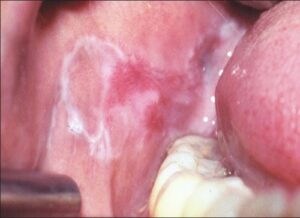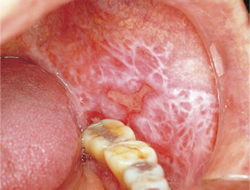Oral Lichen Planus
Definition
Lichen planus is a skin condition of unknown cause. When it present inside the mouth is called “oral” lichen planus. It is a chronic disease, with quiescent periods and exacerbation episodes. It is more common in women.
Presentation
Most commonly, Lichen planus presents with white patches in the mouth, usually on the cheeks. It usually forms a characteristic white network. It can appear anywhere in the mouth. Some times it manifests with areas of ulceration and erosions; these areas are usually painful. Pain and burning is exacerbated with spicy food and smoking.
Cause
The cause of lichen planus is unknown. It is speculated that lichen planus is an immunological condition. Some medications have been linked to its appearance, whereas a similar type mucosa reaction is seen in cases of amalgam feelings. However, as of today, no clear cut risk factors have been identified.
Diagnosis
An experienced OMFS surgeon will diagnose your oral lichen planus with clinical examination. Occasionally, a biopsy might be needed (link to my biopsy definition).
Treatment
Lichen planus is a chronic condition; there is no cure. Patients are followed up for 2 main reasons: Firstly, because there is a small but well documented risk of malignant transformation and secondly, lichen planus might be symptomatic and these symptoms require management. The management is fairly simple and includes a steroid-based mouthwash. Avoiding spicy food and certain irritants (tomato, cinnamon) will help alleviate the symptoms. In cases of persistent and very symptomatic lichen planus, ablation with laser has shown to be beneficial.
Malignant transformation
It is rare for lichen planus to turn into cancer, but it does happen. Around 1% of patients that are diagnosed with lichen planus over 10 years have a risk of developing mouth cancer.
Self care
You can’t stop yourself from getting lichen planus and there is nothing to do to get rid of it. You can, however, reduce the risk of malignant transformation and alleviate the symptoms by not smoking, not drinking excessive amounts of alcohol, maintaining good oral hygiene and avoid spicy food.


